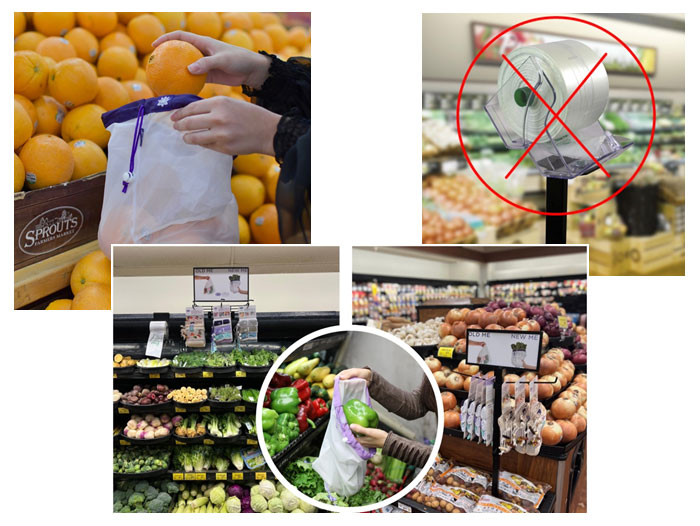California First to Ban Plastic Produce Bags
November 11, 2022 | 3 min to read

SAN DIEGO — California just became the first state to sign a bill that bans the distribution of plastic “pre-check out” bags. Gov. Gavin Newsom’s recent signing of Senate Bill 1046 will affect all grocery stores in California and eliminate those rolls of plastic bags we see in almost every produce section. State Sen. Susan Talamantes Eggman (D-Stockton) authored the bill, which passed the legislature on a party-line vote.
The bill defines a pre-checkout bag as a “bag provided to a customer before the point of sale, is designed to protect an item from damaging or contaminating others in a checkout bag, or contains an unwrapped food item such as produce.” Per SB1046, a store cannot provide “a pre-checkout bag to a customer if the bag is not either a compostable bag, as described, or a recycled paper bag.”
The California Grocers Association, according to media reports, opposed the law and in a letter to Eggman in April, asked for supermarkets to be given until 2025 to phase in the new compostable bags so grocers and manufacturers would have more time to ramp up.
Even though the bill goes into effect on Jan. 1, 2025, grocers and vendors, such as Lotus Sustainables, are already working on initiatives to help reduce plastic waste with reusable produce bags. “The waste and costs are enormous” says Farzan Dehmoubed, CEO Lotus Sustainables. “The average grocery store gives away over 2.2 million plastic produce bags per year at a cost of almost $16,000 annually. For a retailer like Albertsons with 2250+ stores nationwide, that’s almost 5 billion plastic bags at a cost of $35 million per year”.
This is one of the reasons that Ralph’s has proactively partnered with Lotus Sustainables for the past few years to mitigate plastic waste. In addition, major grocers such as Gelsons, Albertsons, and Sprouts are creating initiatives and stations around Lotus’ top-selling product, the reusable fabric Lotus produce bag, a washable and durable mesh bag that can be reused hundreds of times for transport and storage of produce. Seeing this trend nationally, TARGET recently expanded Lotus Reusable produce bags into over 1,400+ stores with great success.
“Most consumers don’t realize that plastic bags aren’t recyclable in their recycling bin. Plus, plastic producebags have a higher chance of ending up in our oceans and being mistaken for food by marine life as they resemble jellyfish” said Farzan.
The new law passes six years after California banned single-use plastic bags in 2016 in an effort to push more people to find sustainable alternatives. From 2010 to 2019, the number of plastic bags collected at beaches, creeks and lakes by volunteers at California’s annual Coastal Cleanup Day dropped 61%, from 65,736 to 25,768, according to reports.
Earlier this year, NJ became the latest state to ban both single use and paper plastic bags. For the most part, New Jersians seem to have adapted well to this. What was once a practice among some shoppers is now common for most. Although plastic bag bans have become most prevalent in the east and west coasts of the country, over 75% of our states now have some sort of plastic bag ban bill passed or in the works.
Nationally, Americans use over 100 billion plastic bags annually, with the average family’s share per year being 1500 bags, according to the Natural Resources Defense Council. California continues to push the limits in reducing its carbon footprint, and plastic bags are a step in that direction. A single plastic bag can take up to 1,000 years to breakdown in a landfill, the byproduct of which is microplastics, another growing problem. It is estimated every American consumes up to a credit card’s worth of these microplastics per week.
Switching from plastic bags to reusable produce bags is a small adjustment that can make a big impact. “We believe little actions can solve big problems facing our planet and that there isn’t resistance to change, there’s resistance to mediocrity and compromise” Said Jennifer Duvall, Co-Founder Lotus Sustainables.
